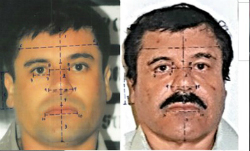Just over 16 months after he was captured, Mexico’s legendary drug trafficker Joaquin “El Chapo” Guzman escaped from a maximum security prison. The embarrassing event has the potential to torpedo the rest of President Enrique Peña Nieto’s administration and roil relations between the US and Mexico.
According to the National Security Commission (Comision Nacional de Seguridad – CNS), Guzman was last seen at 8:52 p.m. local time, July 11, in the shower area of the Altiplano prison. When he did not appear in his cell, authorities checked and “found it empty.”
In a press conference, CNS head Monte Alejandro Rubido said El Chapo escaped via tunnel specially constructed beneath the showers that measured 50 cm x 50 cm at the point of departure, and connected to a ladder that extended 10 meters below the surface.
From there, the tunnel widens, reaching 1.7 meters in height and about 70 to 80 centimeters in width, Monte Rubio said; it stretches 1.5 kilometers and includes air ducts, lighting and was built with high-quality construction materials, he added.
Authorities also found a motorcycle mounted on some sort of rail system, Monte Rubio said, which they presume was used to move materials and possibly Guzman himself as he made his way to freedom.
After the escape, Mexico’s government shut the closest airport and sent hundreds of police and military troops to comb the area around the prison, which is located in a state known for criminal activity. Authorities are also interrogating some 30 prison guards about the escape.
Guzman was captured in 1993 in Guatemala and imprisoned in Mexico, but he escaped in 2001. He was recaptured in February 2014, but not before he had transformed into the world’s most wanted drug trafficker.
SEE ALSO: El Chapo Guzman Profile
Guzman’s second capture was a huge win for the Peña Nieto administration, which has shown itself adept at corralling high-level drug trafficking suspects, even while it has had difficulty reigning in other criminal activities such as extortion and kidnapping.
Peña Nieto’s administration has captured nearly every big capo that his predecessor, Felipe Calderon, did not, including two top Zetas leaders, the head of the Betran Leyva Organization, the leader of the Juarez Cartel and the two leaders of the Knights Templar, among many others. These captures were, up until El Chapo’s escape, a powerful testament that something was going right.
InSight Crime Analysis
In the short term, Guzman’s escape is more of a political than a security question. The high-level captures were the result of what appeared to be better intelligence and coordination amongst security forces. But the most important message was one of political will: Peña Nieto had will and was not beholden to the traffickers.
El Chapo’s stunning escape has the potential to reverse that sentiment completely. Unless the Mexican government recaptures Guzman quickly, his escape will overshadow all those other success stories and give the appearance that the will of the president has dissipated.
It comes at a terrible time for the president. His security strategy remains in tatters following the dramatic disappearance of 43 students last year. Local politicians and police presumably played important roles in the disappearance and coverup of the crime, which was committed by a local criminal group, the Guerreros Unidos. But the national government has shouldered the blame, especially following its slow and shoddy investigation.
The government is also facing down accusations that its security forces are involved in extrajudicial killings. In early July, a report by a leading Mexican human rights organization said the military was ordered to “take…out” suspected criminals in an operation in the municipality of Tlatlaya that ended in the death of some 22 people, at least 12 of whom the government’s Human Rights Commission said were extrajudicially executed. Another report released by Mexico’s National Autonomous University said that for every military death, 32 suspected criminals die.
SEE ALSO: Mexico News and Profiles
The escape could also paralyze the presidency on the security front for Peña Nieto’s three remaining years in office. The agenda is full: among other projects, the president is trying to purge police units and restock others; and his government is continuing the long process or moving the justice system from the inquisitorial to the accusatory system (see Wilson Center background paper on the efforts here – pdf).
Finally, the escape will have a devastating impact on the relations between the United States and Mexico. Various US courts were seeking the extradition of Guzman following his capture last year, but Mexico never really considered them.
Guzman now joins Rafael Caro Quintero, the former head of the Guadalajara Cartel whose early release severely strained US-Mexico relations. Caro Quintero is wanted in the United States for his participation in the murder of a Drug Enforcement Administration agent in 1985. The Mexican government has been trying to recapture Quintero since his release in August 2013.
The longer Chapo eludes the government, the worse it may get for Peña Nieto. Media routinely referred to him as the “eternal fugitive” prior to his capture, a title he has now regained.

